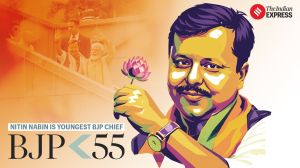Jind dark lining in the silver cloud
Think Haryana and the image that pops up is of militant farmers refusing to pay their power bills. But drive down to Chandigarh from, say, v...

Think Haryana and the image that pops up is of militant farmers refusing to pay their power bills. But drive down to Chandigarh from, say, village Umri near Kurukshetra, and you8217;ll see a completely different picture: of a state going great guns as far as power reforms are concerned.
Umri, for instance, got poly-insulated cables instead of the usual naked wire coming out of the junction box six months ago, and this reduced 8216;line losses8217; mostly, theft from 65 to 27 .
In Rajiv Colony in Panchkula, special meters were installed on the main transformer to measure the level of theft, after which the same poly-insulated cable formula was used the houses are responsible if the cable is nicked, where a joint can be put to steal power to cut line losses by half.
Apart from the additional billing of around Rs 10 lakh per year, the balanced energy load meant that no transformer in the colony burnt this year. Last year, all five burnt and had to be replaced. Similar work all over the state has lead to the burnout rate for transformers falling from 33 in 1997-98 one in three transformers burnt each year to just 16 last year. That, by the way, translates into more regular power for customers, and at stable voltages.
At Panchkula, you have mobile complaint centres, equipped with not just spare cable but even mobile transformers to replace the burnt ones with. Complaints can be, and are, recorded through pager messages, and detailed 8216;exception8217; reports are generated regularly. Who in the colony, for instance, has got a bill that8217;s less than 50 of the average of his neighbours, for instance, says one report, and then the linesmen are sent to get answers. Why did the cold storage8217;s bill fall 75 this year? Because, reads the entry in the log book, no potatoes were bought this time around.
The turnaround, of course, is so stark, and sudden, it8217;s taken even Haryana8217;s power utilities by surprise. For the last nine months of 2001-02, says Tarun Bajaj who heads the Uttar Haryana Bijli Vitaran Nigam, 8216;the records of the Panchkula sub-division show the revenue and expenditure, and then the loss is tabulated as minus Rs 1,600 lakh! Our chaps still haven8217;t got used to the concept of profits and still
talk of losses.8217;
The state8217;s entire power sector, says Energy Secretary Meenaxi Anand Chaudhry, is likely to show a profit this year. Losses are down from Rs 633 crore in 1999-00 to 205 crore the next year, and just 38 crore for the first six months of last year. Sceptics will proclaim this is just financial jugglery, and probably represents paper-billings 8212; who, after all, can collect money from Jind-type farmers?
Jind, Chaudhry admits is a problem, but the figures she8217;s showing, of a 46 hike in revenues over two years, are those of hard cash, deposited in the bank each month. The records also show 10,000 new electronic meters have been installed in the state every week through outside contractors, since the unions aren8217;t too keen to promote anti-theft measures.
What8217;s responsible for all this? 8216;Good governance8217;, is Chaudhry8217;s laconic reply. 8216;8216;Everything is good governance8217;8217;, she says, not averse to overlooking previous wrong-doings if and only if her work gets done. Oil consumption bills for power stations for instance has come down from 18.6 ml per unit of power in 1996-97 to just 3.3 8212; a saving of Rs 180 crore 8212; through 8216;good governance8217;, which also helped save
Rs 111 crore in coal consumption.
All this, of course, is not to say all8217;s well with Haryana8217;s power sector. Though down ten in just two years, they8217;re still a high 38 . But by any standards, especially those of the state the World Bank walked out of when reforms got stalled two years ago, they8217;re truly remarkable.
- 01
- 02
- 03
- 04
- 05































